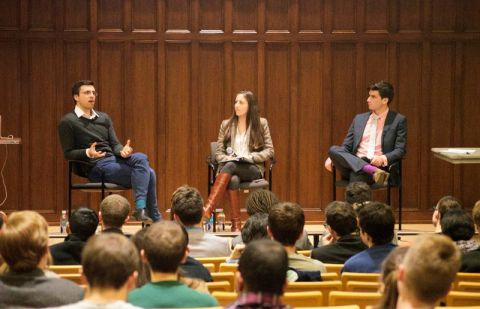
Klein discussed a number of topics, including the increasing divide in American politics and the public view of the media. Tessa Bloechl/The Ram
By Tessa Bloechl
In a discussion that encompassed a wide range of political issues, journalist Ezra Klein informed the small crowd of students that politicians are disappointing people — a reality that, as a journalist, he finds fascinating.
Klein structured his speech, entitled “How Washington Really Works,” as a Q&A conversation between members of Fordham University’s College Democrats and himself. The event was held in Keating 1st auditorium on Monday, Nov. 10.
Klein, former blogger and columnist for The Washington Post and current editor-in-chief of Vox.com, did not originally envision a career in journalism.
“It was an accident born of technology and being in the right place at the right time,” said Klein.
Klein spoke about the increasing polarization in American politics, a theme that ran throughout the discussion. He frequently mentioned the influence of tribal identities and allegiances on American political stances.
“We are good at rejecting information that doesn’t align with our group decisions, and accepting what does,” said Klein when asked how he stayed aware of his own biases.“We should bring more skepticism to the things we believe in than the things we don’t,” said Klein.
At Vox, he attempts to tackle this goal by finding the best possible arguments from both sides of any story.
“Vox.com was built because I found the news frustrating,” said Klein.
According to Klein, the page constraint of print news means that only the latest, up-to-date information can realistically be reported. The assumption is that the reader knows the background and the context, said Klein.
Within the realm of Internet news and blogging, however, the possibility of the inclusion of greater context is an aspect of reporting that Vox currently explores.
A recent Vox creation, Card Stacks, attempts to give readers the necessary context to help them understand important news stories and to make that information accessible and easy to consume.
Though it takes a lot of work to maintain the card stacks and keep them up-to-date, Klein is committed to providing comprehensive information for all the site’s viewers.
On the particular reasons behind a pessimistic view of media influence today, Klein simply stated that the information accessed could either be bad or good. But at present the decisions of policy-makers are “driven by media climate.”
He contends that the media climate seems to be calling for increased division and obstinacy, leading to a hyperpolarized political landscape.
“In the past, there was an overlap between the parties,” said Klein. “But not anymore.”
Klein also outlined the structural advantages that each of the two major parties has over the other, noting that while the Democrats have a structural advantage in the presidential elections, Republicans have the majority representation in Congress. He believes that politics is no longer focused on the issues, but concerned about the next presidential race.
Between structural inequities and increased polarity, the government is moving in a dangerous direction.
We are “pushing toward an un-governable situation,” said Klein. His view of the future state of the American government, should the current trend continue, is not promising. In Klein’s eyes, his own function is to provide the polity with thorough material so it can potentially make informed decisions.
